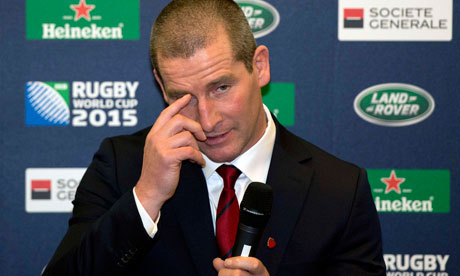England
have received precious few favours in the rugby World Cup draw, copping
possibly the hardest presented to any home nation since the
tournament's inception in 1987
Three years is a long, long time. Who knows how many royal babies there will be by 2015, let alone whether England or Wales will escape from the pool of uncertainty into which they were jointly plunged on Monday?
All we can say for certain is that the hosts have received precious few favours, copping possibly the hardest draw presented to any home nation since the tournament's inception in 1987.
Had the balls been plucked out of the bowl last week even more eyebrows would be arched. England, as second-tier citizens, did at least avoid New Zealand, still smarting from Saturday's record defeat at Twickenham, but a berth in Pool A – Australia, Wales, Oceania 1 (almost certainly Fiji) plus a yet-to-be-determined minnow, has banished complacency instantly. "Pretty tough" was the instant reaction of England's head coach, Stuart Lancaster, and his opposite numbers Robbie Deans and Warren Gatland did not disagree. Although it is perfectly possible several of the coaches and captains earnestly debating their country's chances in London will be watching from a sofa somewhere in 2015, Deans put his finger on England's biggest fear when he pointed out the Wallabies and the Welsh were the two youngest teams in the 2011 tournament.
Theoretically they should be stronger next time. As both reached the semi-finals in New Zealand, they will not be fetching up in England with any sense of inferiority.
Assuming, that is, they actually play their games in England. There were some entertaining scenes after the draw when Roger Lewis, the chief executive of the Welsh Rugby Union, expressed a mischievous wish for England to play Wales in "the best rugby stadium in the world" which, as far as he is concerned, is situated slap bang in the middle of Cardiff.
There would be riots across Middle England if that happened but England will also be watching closely to see where the Wales v Australia contest takes place. Lewis is insisting up to eight tournament games have been pencilled in for the Millennium Stadium and facing the Wallabies in Cardiff would clearly be hugely advantageous for Wales, notwithstanding their dismal autumn results.
The RWC 2015 board, which will ultimately take the decision, can expect to be lobbied furiously from all quarters.
We can also take a wild guess that Lancaster and England would prefer not to face Wales or Australia in their opening fixture. It is not the Rugby Football Union's call, however, and the tournament needs to grab the world's imagination from the outset. Would England v Fiji achieve that more than, say, England v Australia?
The answer is "no" and the organisers also have to be mindful of the hosts' desire to take games around the country. If Lancaster's England are to play away from Twickenham at any stage they will not want to be up against opponents more familiar with, say, Old Trafford or the Stadium of Light, than they are.
Common sense and geography, meanwhile, would suggest Pool B, containing South Africa, Samoa, Scotland and, probably, two out of Japan, United States and Canada, may well be based in the north. The need to shift thousands of tickets to neutrals with no particular rugby affiliation could also see New Zealand asked to play many of their Pool C games in Manchester, Newcastle or Sunderland.
The All Blacks, having been drawn with Argentina and Tonga, should have few problems qualifying but Pool D could be spicier. France and Ireland have a bit of World Cup history and Italy are not a team either of them will take lightly. Should a major pool encounter not involving Wales be staged in Cardiff, France versus Ireland would clearly be a candidate.
If there remains a touch of premature speculation about all this, Lancaster's mind is already whirring. He swiftly indicated that England's mooted warm-up games against Wales will be scrapped and plans to talk to London 2012 officials in an attempt to maximise home advantage as successfully as Team GB did during the summer Olympics.
"I read an article in New Zealand by Dan Carter about playing at home and the ability it gave the team to go home occasionally and have a normal life within the goldfish bowl of the tournament," said Lancaster. "We hope we can use that to our advantage in a home World Cup and give the players a bit of a break."
The world champion All Blacks can certainly testify to the potency of home soil and their coach, Steve Hansen, suggested Saturday's reverse will turn out be "good for us in the long term".
Ominously, he believes defeat will concentrate a few minds. "People were starting to get a little carried away talking about this team being the greatest ever. Subconsciously that can have an effect on young players. But the World Cup is a long way ahead. All I'm thinking about at the moment is a beach towel and a few rocks to put under it after Saturday. The rocks will be sharp. No one likes to lose."
Hansen and Carter respectively have been confirmed as the IRB's coach and player of the year but even they are already looking forward, not back. Lancaster is also among those who can feel a life-changing event just over the horizon. "It's massive for the country to have the World Cup here. So many people will benefit from the tournament and its effect will last way beyond 2015." Unless, of course, the hosts end up drowning in the pool at their own party.

No comments:
Post a Comment